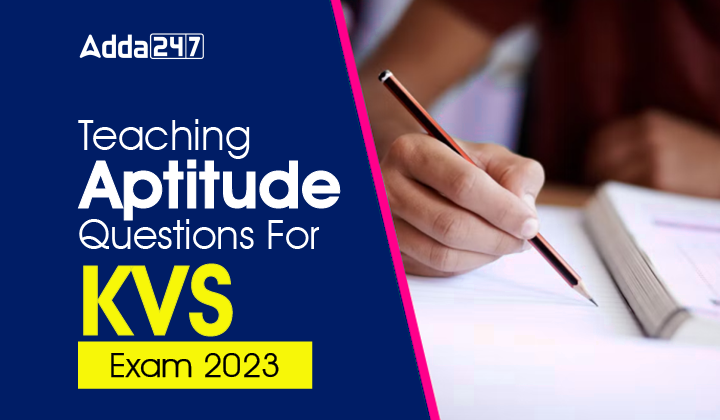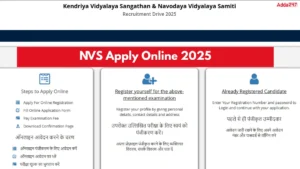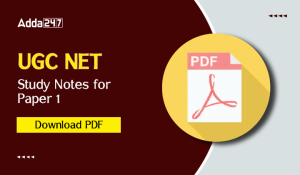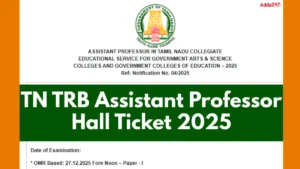Table of Contents
Teaching Aptitude Questions for KVS TGT PGT PRT & Principal Exams: KVS Examination 2023 will be going to start from 7 February 2023 all over India for 13404 vacancies. KVS TGT PGT PRT & Principal Exams have a Teaching Aptitude section to get good scores in Examination. Teaching Aptitude is a common section that comes in KVS TGT PGT PRT & Principal and other post Examination.
Teaching Aptitude is an important section that is related to teaching skills, pedagogy, classroom activities, etc. Here we are going to get a clear idea about Teaching Aptitude and practice with Teaching Aptitude Questions for KVS TGT PGT PRT & Principal Exams.
KVS Recruitment 2025 Out for 9156 – Check All Details
Teaching Aptitude Questions Marking System in KVS Exams
Let’s get an idea about the Teaching Aptitude section which comes in KVS TGT PGT PRT Exam Section.
| Subject | Teaching Aptitude | |
|---|---|---|
| Paper | KVS TGT PGT PRT Principal | |
| Section | PART III | |
| KVS Principal | 120 Marks for 120 Questions | |
| KVS PGT | 40 Marks for 40 Questions | |
| KVS TGT | 40 Marks for 40 Questions | |
| KVS PRT | 60 Marks for 60 Questions | |
| Marking | For the right answer 1 mark | |
| Question Pattern | Objective type | |
| Language | Bilingual | |
| Difficulty level | Subject Concerned i.e. Teaching methodology/B.El.Ed./D.Ed./NTT/JBT/B.Ed | |
Teaching Aptitude Questions For KVS TGT PGT PRT Exam
ADDA247 is providing you with all study material and study notes for all KVS teaching exams which are based on their latest exam pattern & syllabus. Teaching Aptitude section which is named Perspectives on Education and Leadership in KVS Revised Syllabus and Exam Pattern. Here we are providing Teaching Aptitude Questions for KVS TGT PGT PRT Exam which can help you in upcoming KVS exam preparation.
KVS PRT Study Material 2023: Download FREE Study Material, Quizzes Here
Q1. People are especially good at quickly detecting facial expressions of
(a) love
(b) anger
(c) surprise
(d) happiness
Q2. Expressing anger can be adaptive when you
(a) retaliate immediately
(b) have mentally rehearsed all the reasons for your anger
(c) count to ten, then blow off steam
(d) first, wait until the anger subsides, then deal with the situation in a civilized manner
Q3. Which of the following are the methods of learning?
1. Teaching
2. Trial and Error
3. Imitation
4. Experimentation
5. Questioning
6. Reflection
Codes :
(a) 1, 2, 3 and 5
(b) 2,3,4 and 6
(c) 1, 3 and 5
(d) All of the above
Q4. Which of the following statements applies in the context of online teaching methods?
1. Teacher does not help in the construction of knowledge
2. There is more role for learners in the instructional process
3. The delivery of instruction is always verbal
4. There are more chances of self – learning and motivation
5. It is rigid in nature
Codes :
(a) 1, 2 and 4
(b) 2 and 4
(c) 2,3 and 5
(d) 1, 3 and 5
Q5. In the two lists given below, List – I provide the list of teaching methods, while List – IT indicates the factors helpful in rendering them effective. Match the two lists and choose the correct answer from the code given below.
List – I (Teaching Methods) List – II (Factors helpful in making them effective)
1. Expository method A. Promotes student autonomy and enhances learning
2. Discovery method B. Open-ended and collaborative exchange of ideas
3. Discussion method C. Learning by doing
4. Personalised method D. Systematic, step-by-step presentation
Codes :
(a) 1 – C, 2 – D, 3 – B, 4 – A
(b) 1 – D, 2 – C, 3 – A, 4 – B
(c) 1 – D, 2 – C, 3 – B, 4 – A
(d) 1 – D, 2 – B, 3 – C, 4 – A
Q6. The constructivist approach to the teaching-learning process is being emphasized at all levels of education, Which of the following methods is mainly based on this approach?
(a) Lecture Method
(c) Discussion Method
(b) Project Method
(d) All of the above
Q7. Which of the following assists students in managing their own learning by modelling a problem-solving technique?
(a) Drill and Practice
(b) Mental Modeling
(c) Discovery Learning
(d) Direct instruction
Q8. Which one of the following is not correct in the context of class teaching or group teaching?
(a) It gives motivation for doing group tasks
(b) It enhances the teaching ability of the teacher
(c) It saves money, time and space
(d) It is not useful for dull students
Q9. The special feature of the play way method is that :
(a) sports/games take the place of work (studies)
(b) there is no importance of work (studies) in it
(c) the monotony or boredom of work (studies) is removed by incorporating sports/games
(d) education cannot be completed without sports/games
Q10. The word ‘kindergarten’ has been drawn from the German language. Its meaning is a
(a) small garden
(b) beautiful garden
(c) flower garden
(d) children’s garden
Q11. In the kindergarten system of teaching, the status of the teacher is like that of a :
(a) potter
(b) gardener
(c) (earthen) lamp
(d) referee
Q12. The Montessori system of education :
(a) teaches students writing and reading skills through the psychological method
(b) does not believe in the system of auto-education
(c) does not develop self-discipline among students
(d) does not give adequate importance to the interests and curiosity of students
Q13. The Montessori system of teaching is :
(a) focused on the teacher
(b) focused on the textbook
(c) focused on the child
(d) focused on the study material
Q14. Who was the pioneer of the Heuristic method of teaching?
(a) Herbert Spencer
(b) Professor Armstrong
(c) John Adams
(d) Monroe
Q15. In which system of education, was the teaching of senses emphasised upon?
(a) Kindergarten System
(b) Montessori System
(c) Heuristic System
(d) None of these
Q16. “This system trains the student to find the facts, rules and principles through his own efforts, organise the knowledge gained and define the general rules.” The aforesaid statement is referred to the
(a) Montessori system of teaching
(b) Kindergarten system of teaching
(c) Heuristic system of teaching
(d) Play-way method of teaching
Q17. With whom, is the project teaching method associated?
(a) Rousseau
(b) Froebel
(c) Devy and Kilpatric
(d) Armstrong
Q18. The project method of teaching imparts practical knowledge to the student, because :
(a) it accepts the personal diversities (of the students)
(b) it develops the latent powers of the student
(c) the basis of knowledge of the student is his personal experiences
(d) it gives an opportunity to ponder over the logic and for debates
Q19. All the teaching methods of modern type, like Kindergarten, Montessori, Dalton Basic and project methods :
(a) are based on the principle of the activity method
(b) are based on the synthetic method
(c) are based on the laboratory method
(d) are not based on any one of these methods
Q20. The aim of education should be
(a) To development vocation skills in the students
(b) To develop social awareness in the students
(c) To prepare the students for the examination
(d) To prepare the students for practical life
Q21. A time-bound testing programme for the student should be implemented in school so that
(a) The progress of the students should be informed to their parents
(b) A regular practice can be carried out
(c) The students can be trained for final examinations
(d) The remedial programme can be adopted on the basis of the feedback from the Results
Q22. The quality of schools education is exclusively depending upon
(a) Infrastructural facilities
(b) Financial provisions
(c) International support
(d) The quality of teacher education
Q23. The idea of Basic Education is propounded by
(a) Dr Zakir Hussain
(b) Dr. Rajendra prasad
(c) Mahatma Gandhi
(d) Rabindranath Tagore
Q24. The most important indicator of the quality of education in a school is
(a) Infrastructural facilities of a school
(b) Classroom system
(c) Textbooks and teaching- learning material
(d) Student Achievement level
Q25. ‘Self–regulation’ of learners refers to
(a) Their ability to monitor their own learning
(b) Creating regulations for student behaviour
(c) Rules and regulations made by the student body
(d) Self–discipline and control
Q26. Learners should not be encouraged to:
(a) Ask as many questions as possible both inside and outside the class
(b) Actively interact with other learners in group work
(c) Participate in as many co-curricular activities as possible
(d) Memorize all the answers to questions that the teacher may ask
Q27. Critical pedagogy firmly believes that.
(a) The learners need not reason independently
(b) What children learn out of school is irrelevant
(c) The experiences and perceptions of learners are important
(d) The teacher should always lead the classroom instruction
Q28. Young learners should be encouraged to interact with peers in the classroom so that.
(a) They can learn answers to questions from each other
(b) The syllabus can be covered quickly
(c) They learn social skills in the course of study
(d) The teacher can control the classroom better
Q29. The word ‘Compulsory’ in the ‘Right to free and compulsory education 2009’ means
(a) Parents are compulsorily forced to send their children to school to avoid punitive action
(b) Compulsory education will be imparted through continuous testing
(c) Central government will ensure admission, attendance and completion of elementary education
(d) Appropriate governments will ensure admission, attendance and completion of elementary education
Q30. The ‘Lab schools’ advocated by John Dewey were examples of this.
(a) Factory Schools
(b) Progressive Schools
(c) Public Schools
(d) Common Schools
| Practice for KVS Examination with Other Subjects | |
| Quantitative Aptitude & Reasoning Questions | Click Here |
| Computer Questions | Click Here |
| General Knowledge Questions | Click Here |
| Teaching Aptitude | Click Here |
Solutions
S1. Ans.(b)
S2. Ans.(d)
S3. Ans.(d)
S4. Ans.(b)
S5. Ans.(c)
S6. Ans.(a)
S7. Ans.(b)
S8. Ans.(b)
S9. Ans.(c)
S10. Ans.(d)
S11. Ans.(b)
Sol. The gardener takes care of his plants very attentively. The same is the role of the teacher in the K.G. system where the teacher looks after children very seriously and takes every measure not to get them spoiled.
S12. Ans.(a)
S13. Ans.(c)
S14. Ans.(b)
S15. Ans.(b)
S16. Ans.(c)
S17. Ans.(c)
S18. Ans.(c)
S19. Ans.(a)
S20. Ans.(d)
S21. Ans.(d)
S22. Ans.(d)
S23. Ans.(c)
S24. Ans.(d)
S25. Ans.(a)
S26. Ans.(d)
S27. Ans.(c)
S28. Ans.(c)
S29. Ans.(d)
S30. Ans.(b)
Why do we need to Practice Teaching Aptitude Questions?
Check out the following pointers to know why it is important to Practice Teaching Aptitude Questions.
- Teaching Aptitude is an important section for KVS Teaching Exam it will help you in better preparation
- These questions will be time-saving for the preparation
- Teaching Aptitude Questions will cover all topics related to KVS Exam Syllabus
- It will help in Teaching Aptitude Practice with different questions
- Teaching Aptitude Questions will help you in revision when Exam time comes.




 NVS Recruitment 2025 Out for 5841 Vacanc...
NVS Recruitment 2025 Out for 5841 Vacanc...
 UGC NET Study Notes for Paper 1, Downloa...
UGC NET Study Notes for Paper 1, Downloa...
 TN TRB Assistant Professor Hall Ticket 2...
TN TRB Assistant Professor Hall Ticket 2...












